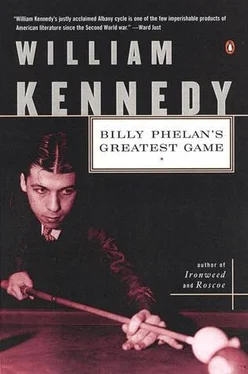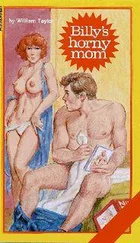The city desk told him that lights were out all over the city and parts of Colonie, Watervliet and Cohoes. All hospitals had been called an hour earlier and told a power failure was possible, and not to schedule any operations unless they had their own generators. Nursing homes were also alerted. But the power company said it hadn’t made the calls. Who had? Nobody knew.
Martin went back to the bar and ordered a Grandad on ice and looked at the photo behind the bar. A new star shone on the chest of Scotty Streck, brighter than all others. In the kerosene lamplight the men in the photo moved backward in time. They were all smiling and all younger than their pictures. They were boys and young men under the shirtsleeved, summer sun. None of them was dead or would ever die.
“Lights are out all over town,” Martin told Red Tom.
“Is that a fact? I was listening to the radio when they went. Dewey was on, talking about Albany.”
“Albany? What was he saying?”
“He mentioned Patsy, and that was all I heard.”
“Did he mention Charlie Boy?”
“Not that I heard.”
Martin gulped his drink and went outside. People were clustered under the canopy at the station, all cabs were gone, and a West Albany trolley was stalled between Maiden Lane and Steuben Street. Martin could see it in the headlights of cars. The night was a deep, moonless black, with only a few stars visible. It was as if rural darkness had descended upon the city. Faces were unrecognizable three feet away. Albany had never been so dark in Martin’s memory. There were gas lamps in his boyhood, then the first few electric lights, now the power poles everywhere. But tonight was the lightless time in which highwaymen had performed, the dark night of the century gone, his father’s childhood darkness on new streets cut out of the raw hills and the grassy flats. A woman with a bundle came by, half running toward Clinton Avenue, pursued by the night. Alongside Martin, a match flared and he turned to see Morrie Berman lighting a cigar.
“What news do you hear?”
“Only that they’re out all over town.”
“I mean about the McCall kid. You fellows at the paper turn up any news?”
“I heard there was another ransom note.”
“Is that so?”
“Signed by Charlie Boy. I didn’t see it, but from what I gather there’ll be another go-between list in the paper tonight.”
“They didn’t like us on the first list?”
“So it seems.”
“You hear anything else?”
Dark shapes moved in behind Morrie, and Martin withheld his answer. The shapes hovered.
“Let’s take a walk,” Martin said and he took a step toward Steuben Street. Morrie stepped along and they moved south on Broadway, candles in the Waldorf, a bunch of men on the street in front of the Monte Carlo. They stepped around the men in the light of a passing auto. Martin did not want to speak until they had turned the corner onto Steuben. They passed Hagaman’s Bakery and Joe’s Bookshop on Steuben Street, where Martin knew his father’s early novel, The Mosquito Lovers , and the volume of his collected plays were sitting in faded dust jackets in the window, and had been for months, ever since the success of The Flaming Corsage.
“So what’s the secret?” Morrie asked.
“No secret, but I don’t want to broadcast it. I know you’re a friend of Maloy and the news is they’re looking for him. And Curry.”
“Why tell me? They got a lot of friends.”
“You asked for news. They’ve both been out of town a week.”
“So that ties them in?”
“No, but even their families don’t know where they are.”
“Hell, I saw Maloy two or three days ago on Broadway. They’re apt to be anywhere. Maloy’s crazy and Curry’s a moron. But they wouldn’t mix up in a thing like this, not in their own town.”
“Nevertheless, they’re looking for them.”
“They’ll turn up. What else do you hear?”
“The note said they’d starve Charlie Boy till the ransom was paid.”
“Tough stuff.”
“Very.”
Up toward Pearl Street, a window shattered and a burglar alarm rang and rang. Martin saw a silhouette running toward him and Morrie. The runner brushed Martin’s elbow, stepping off the curb as they touched, but Martin could not see the face.
“Somebody did all right,” said Morrie. “Ain’t that a jewelry store there?”
“Right,” said Martin. “Just about where Henry James’s grandmother used to live.”
“Who?”
“An old-timer.”
And on the other corner, DeWitt Clinton lived. And across the street, Bret Harte was born. And up Columbia was one of Melville’s homes, and on Clinton Square another. An old man had answered when Martin knocked on the door of the Columbia Street house and said, yeauh, he seemed to remember the name Melville but that was next door and they tore that house down and built a new one. Melville, he said. I heard he moved to Troy. Don’t know what become of him after that.
Martin and Morrie neared Pearl Street, the glimmerings of light from the cars giving them a fragmented view of the broken window in Wilson’s Jewelry Store. When they saw the window, they crossed Pearl. Martin looked down toward State and saw a torchlight parade coming north in support of the nomination of Millard Fillmore. The John G. Myers department store collapsed into itself, killing thirteen and making men bald from flying plaster dust. Henry James, suffused in the brilliance of a sunny summer morning, walked out of his grandmother’s house, opened the front gate, and floated like a flowered balloon into ethereal regions. Martin walked in the phosphorescent footsteps of his father and his grandfather.
“Where the hell are we walking?” Morrie asked.
“Just around,” said Martin. “You want to go back down?”
“I guess it’s all right.”
They walked to Clinton Square, where two more trolleys were stalled on the bend. A siren screamed and stopped, back near Steuben and Pearl. Martin and Morrie, their eyes grown accustomed to the darkness, watched the shadowy action in front of the Palace Theater, hundreds waiting to go back inside and see the rest of Boys’ Town with Spencer Tracy as Father Flanagan, the miracle man. There is no such thing as a bad boy.
“They got some kind of light in the Grand Lunch,” Morrie said. “You want some coffee?”
“No, you go ahead. I want to watch the panic.”
“What panic?”
“There’s got to be panic someplace with this much darkness.”
“Whatever you say. See you down below.”
In the Sudetenland only last week when Hitler arrived, at nightfall there was an epidemic of suicide.
In France in 1918, Martin had heard a man scream from the darkness beyond a farmhouse where a shell had just hit. Help me, oh God, oh heavenly God, help me, the man yelled, and then he wailed his pain. Martin nudged a corporal and they crawled toward the voice and found an American soldier pinned between two dead cows. The top cow was bloated from inhaling the explosion. Martin and the corporal could not move the bloated cow so they pulled the squeezed man by his arms, and the top half of him came away in their grip. He stopped screaming.
Martin crossed Pearl and went into the K. of C. and called the city desk by candlelight. Viglucci said there was still no explanation for the blackout, but up at Harmanus Bleecker Hall the audience had panicked when the lights went. People shoved one another and Tip Mooney was knocked down and trampled.
Punishment.
“This bum’s a Cuban and so’s one of the broads,” said Morrie as Billy and Martin followed him down two slate steps to the basement doorway beneath the high stoop. Morrie rapped and the pimp peered out in his puce shirt, his hair brilliantined, his shoes pointed and shiny, both ends of him gleaming in the harsh backlight. The lights of the city had come back on an hour earlier.
Читать дальше












